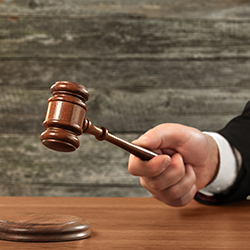News Archive
A Little Jurisdictional Divide On Pre-Trial Stand-Your-Ground Immunity Hearings
June 12, 2017
I have previously suggested that Alabama courts should follow the uniform persuasive authority of other states (Colorado, Georgia, Florida, South Carolina) concerning immunity from prosecution for Stand-Your-Ground type cases. (See here, here, here, and here.) I suggested further that the procedures of these immunity hearings from these other jurisdictions was uniform.
However, two states (Kentucky and Kansas), with copycat Stand-Your-Ground immunity statutes, have shifted the burden onto the prosecution. More importantly, though, they have adopted a different standard of proof: probable-cause. The Kansas Supreme Court ruled in State v. Ultreras, 296 Kan. 828, 845, 295 P.3d 1020, 1031 (2013)
"In summary, we find that the standard of proof for whether a defendant is entitled to immunity from criminal prosecution under K.S.A. 21–3219 is probable cause. We further find that the State bears the burden of establishing proof that the force was not justified as part of the probable cause determination required under K.S.A. 21–3219(b) and (c)."
The Kansas Court largely followed the precedent of Kentucky. The Kentucky Court in Rodgers v. Com., 285 S.W.3d 740, 755 (Ky. 2009) adopted a probable-cause type hearing position.
"The sole remaining issue is how the trial courts should proceed in determining probable cause. The burden is on the Commonwealth to establish probable cause and it may do so by directing the court’s attention to the evidence of record including witness statements, investigative letters prepared by law enforcement officers, photographs and other documents of record. Although Rodgers advocates an evidentiary hearing at which the defendant may counter probable cause with proof “by a preponderance of the evidence” that the force was justified, this concept finds no support in the statute. The legislature did not delineate an evidentiary hearing and the only standard of proof against which a defendant’s conduct must be measured is the aforementioned probable cause."
My thoughts of these divergent jurisdictions:
First, regardless of this potentially important divide between jurisdictions, one thing is clear: we have two more states affirming the right to a pre-trial Stand-Your-Ground immunity hearing.
"By declaring that one who is justified in using force “is immune from criminal prosecution,” and by defining “criminal prosecution” to include “arresting, detaining in custody, and charging or prosecuting the defendant,” the General Assembly has made unmistakably clear its intent to create a true immunity, not simply a defense to criminal charges."
Rodgers v. Com., 285 S.W.3d 740, 753 (Ky. 2009)
Secondly, shifting the burden of proof onto the prosecution may be better policy. Commenting on the burden of proof issue, one concurring Florida court judge stated the following:
"Kentucky and Kansas, states with statutes
that were modeled directly on our “Stand Your Ground” law, have found that the burden of proof properly rests with the State at the pretrial stage to demonstrate that the use of force in self-defense was unjustified. This construction creates a better procedural vehicle to test the State’s case at the earliest possible stage of a criminal proceeding. Self-defense immunity statutes are designed to relieve a defendant from the burdens of criminal prosecution from arrest through trial. Placing the burden of proof on the State throughout each phase of criminal prosecution best fulfills the legislative intent to create a broad grant of immunity."
Bretherick v. State, 135 So. 3d 337, 344 (Fla. Dist. Ct. App. 2013) review granted, 145 So. 3d 821 (Fla. 2014) (However, in any other case involving immunity, the burden rests with the Defendant and the standard of proof is preponderance of the evidence.)
Third, the shift to a probable-cause style pretrial immunity hearing would gut the statute and make the immunity provision meaningless. The Florida Supreme addressed this well:
"We also reject the State’s contention that the pretrial hearing on immunity in a criminal case should test merely whether the State has probable cause to believe the defendant’s use of force was not legally justified. Prior to the enactment of [the Stand-Your-Ground statute], Florida law defined certain types of justified force… and the Florida Rules of Criminal Procedure mandated that a trial judge make a pretrial nonadversarial probable cause determination either before or shortly after a defendant was taken into custody…. “It is a basic rule of statutory construction that ‘the Legislature does not intend to enact useless provisions, and courts should avoid readings that would render part of a statute meaningless.’ ” Martinez v. State, 981 So.2d 449, 452 (Fla.2008) (quoting State v. Bodden, 877 So.2d 680, 686 (Fla.2004)). Accordingly, the grant of immunity from “criminal prosecution” in [the Stand-Your-Ground statute must be interpreted in a manner that provides the defendant with more protection from prosecution for a justified use of force than the probable cause determination previously provided to the defendant by rule."
Dennis v. State, 51 So. 3d 456, 463 (Fla. 2010)
